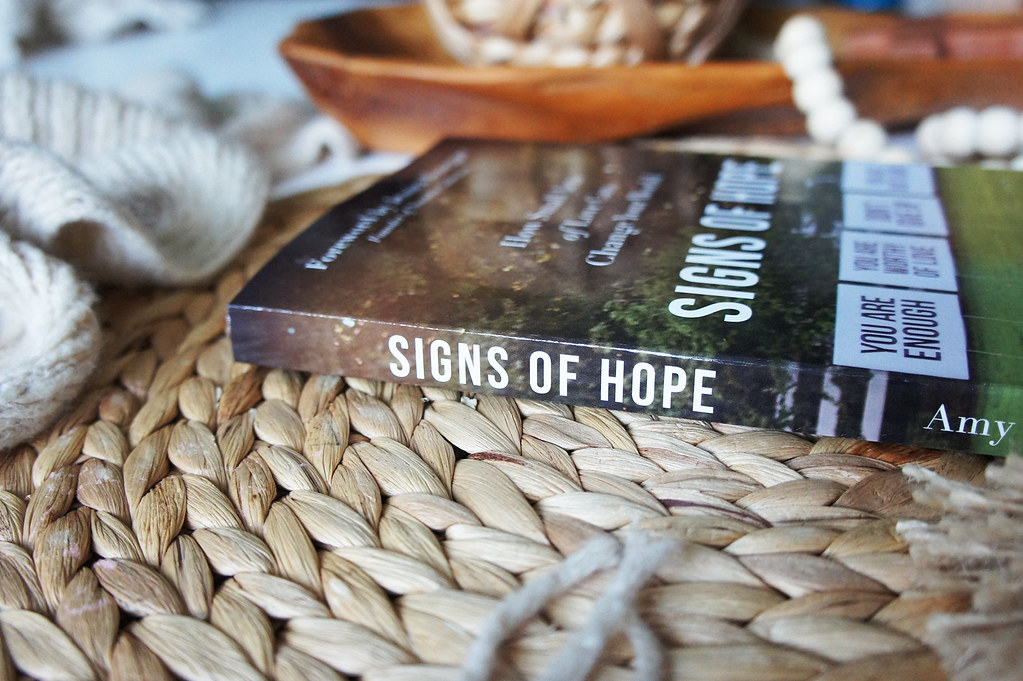Heartbroken after a string of suicides in her community, Amy Wolff decided being unqualified and busy didn’t exclude her from taking action. She could have never predicted that her small action would spark a global grass-roots movement of imperfect people demonstrating unconditional love and offering hope to others despite their own wounds and fears. In her upcoming book Signs of Hope, Amy explores what it means to love well and how to be a giver and a taker of hope. It’s a grace to welcome Amy to the farm’s front porch today…
“God, what’s wrong with me? Why can’t I cry? Give me tears. Please.”
I was 14 years old sitting in my grandmother’s bathtub calling out to God in confusion.
Three months prior, on August 9th 1998, my world shattered.
After sitting antsy through Sunday school on a gorgeous summer morning, my older brother Jeremy, his friends and myself schemed to head to the lake for a day of swimming.
It’s odd what details stick. Windows down, hair whipping, while Marcy’s Playground blasted from the radio. Soon after we arrived, Jeremy and his friends started swimming across an inlet of the lake.
That’s when he got fatigued.
I heard commotion in the water and walked down to the bank to see Jeremy struggling in the water. I tried to shout encouragement to him, to float on his back to conserve strength.
He looked at me. He heard me. He tried.
But within a few minutes he disappeared under the water for the last time.









I called my parents. Water rescue came. Forty-five minutes later they found his body but couldn’t resuscitate him.
We said goodbye in the back of an ambulance through a yellow plastic bag and signed his death certificate on a curb in the parking lot.
Although my eyes were almost swollen shut those first few days, my tears became less and less frequent. To the point of sitting in my grandmother’s tub one night begging God for tears. Tears meant Jeremy mattered. He deserved them. But I could not muster them no matter how hard I tried.
A disorienting peace covered me in the weeks after Jeremy’s death.
It didn’t fill the gaping hole of his absence, but it sheltered the inmost, fragile parts of me. Why wasn’t I mad at God? Why didn’t I suffer survivor’s guilt? Why didn’t I have nightmares or flashbacks? What’s wrong with me?
Grief is not rational nor predictable.
And neither is the work of God.
There’s no other way to explain it. God protected me.
God has been faithful to ‘bestow on them a crown of beauty instead of ashes, the oil of gladness instead of mourning, and a garment of praise instead of a spirit of despair. (Isaiah 61:3)
The loss, although devastating, brought deep clarity to my zitty-teenager-self about to start high school. It brought eternal perspective. Through the years of boyfriend drama, school dances, football games, driving license tests, and college applications, a soul-deep rallying cry persisted.
God, use me. Make my days count.
God, use me. Make my days count.
Nineteen years later, in May 2017, it took an unexpected turn.
After a string of suicides in our town, my family anonymously staked 20 simple, uplifting yard signs in high-traffic areas. They said, “Don’t give up”, “You are worthy of love”, “Your mistakes do not define you”.
It was random. It didn’t feel like obedience to a divine calling. It was our desperate attempt to offer renewed hope to a weary world. It just felt right.
But in hindsight, I see God’s favor all over it. It exploded into the most beautiful, grassroots movement of humanity showing its best self.
A global movement was (accidentally) born, equipping anyone anywhere to tangibly spread messages of hope and love through simple tokens, like yard signs. All 50 states. Over 26 countries.
When I scroll through all the messages, of all the times people encountered our tokens of hope at just the right place, at just the right time, I shake my head in disbelief. Women leaving abusive relationships. People going to rehab and staying sober. Men deciding not to harm themselves. People finding courage to keep fighting cancer. Story after story of people claiming hope from messages on our yard signs, car decals and wristbands.
How could something so simple have such a big impact?
Hope is not rational nor predictable.
And neither is the love of God.
His love repurposes our pain into clarified purpose.
It beckons us outside our church walls, to do life with our neighbors (even the irritating ones). To show each other our scars in solidarity. To have mouths that drip with hope-filled words and affirmations.
When we pray, whether with fiery faith or weary whimpers “God use me. Make my days count.”, let’s stand in awe of what He does.
Redeemer of All Things.
Amy Wolff is President of a speaker coaching company, Distinction Communication, and a volunteer TEDx speaker coach. In 2017 she accidentally started a global movement of spreading love and hope through simple yard signs, which became the Don’t Give Up Movement. Amy enjoys engaging in difficult conversations with unlikely friends, vacuum lines in her carpet, nurturing a ridiculous amount of house plants, leading teams to Rwanda, and constant adventures with her two daughters and husband while living in the heart of Oregon’s wine country.
In her book Signs of Hope, Amy delivers an intimate collection of stories about the power of hope and love in the midst of suffering. This book is a feel-good, call-to-action that will restore your belief in humanity and empower you to live a life of impact.
Changing the world, or at least your corner of it, is easier than you think. And the time is now.
[ Our humble thanks to Zondervan for their partnership in today’s devotion ]








